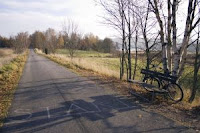The End is our Beginning
By Erin Martin
December 3, 2008
 Isaiah 40:1-11, Mark 1:1-8
Isaiah 40:1-11, Mark 1:1-8Everyone knows that Advent is about beginnings. The season marks the start of a new Christian year. It heralds the beginning of the “good news” of Jesus Christ, and it points to the origin of the Incarnation, the birth of Jesus. Every year in Advent we begin the preparations for Jesus’ coming only to do it all again the next year. Advent is the time to begin again. Not everyone understands, however, that Advent is also about endings. The season of Advent begins with the end, with an account of Jesus’ final coming at the end of time.
John the Baptist announces the fulfillment of prophecy, the end of waiting, a last chance to repent. Even Isaiah speaks of the end in Advent, the end of exile, the end of Israel’s punishment, her penalty paid. To focus exclusively on what begins in Advent is to neglect a significant part of the “good news” of the season, that is, in Advent the end is our beginning.
One way to understand such a paradox is to constantly remind ourselves that our preparations during Advent are never primarily about Christmas. While the story of baby Jesus born in a manger on that silent and holy night has captivated our sentimentalities, the birth story is only half the story. In Advent, we get ready for Jesus’ birth by pointing beyond it to a final day of glory. Joyce Ann Zimmerman puts it this way, “From Isaiah to John the Baptist through Jesus to us, the beginning continues until the valleys are filled and mountains made low, until paths are finally made straight to a new heaven and a new earth.” In other words, always keeping the end in mind we begin again.
I am fascinated by the fact that the Isaiah 40 text for Advent is liturgically chiefly a funeral text. In the face of death, it is strangely comforting to be reminded that our life is fleeting, that our constancy is like the flower of the field. Knowing that we will wither and fade while God’s word will stand forever helps locate our lives within the larger eternal life of God. To quote a popular funeral hymn, “in our end is our beginning, in our time, infinity.” Our end is inextricably bound up with Jesus’ end, which in light of the resurrection we learn is only the beginning.
As we begin again this year the season of Advent, may we also not lose sight of the end. May we always remember that the manger stands in the shadow of the cross. The unfinished nature of Mark’s gospel has come to exemplify this tension. When we arrive at the end of Mark’s gospel, the only way to discover how it ends is to begin again. John Stendahl writes, “We return to reread the story, to start again with fresh ears and a new heart. The title at the beginning of Mark welcomes back those who come again from the empty tomb, seeking Jesus alive and anew.” In the Advent of Jesus, our beginning is the end.